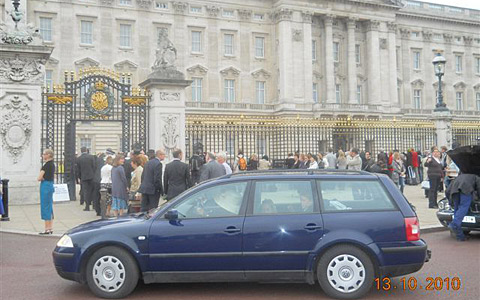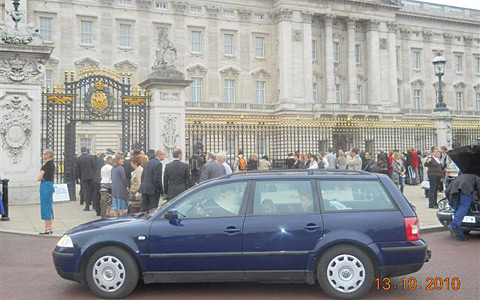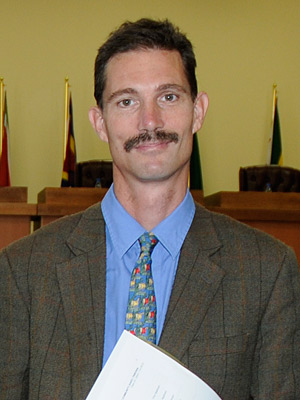Zim commercial farmer receives MBE from Queen Elizabeth II
Ben Freeth (40), a commercial farmer from Chegutu in Zimbabwe?s Mashonaland West Province, was presented with an MBE (Member of the British Empire) award by Queen Elizabeth II at a ceremony in Buckingham Palace last week.
Freeth was part of a group of close to 100 people from across the world who had been recognised on the mid-year British Diplomatic Service and Overseas List and were invited to the palace for October?s investiture ceremony.
The British honours system, which evolved over 650 years, recognizes merit, gallantry and service. Honours lists are released at New Year and on the Queen?s official birthday in June, and feature a wide variety of people from different backgrounds and countries.
Freeth received his award ?For services to the farming community in Zimbabwe?.Accompanied by his wife Laura and their three children, Joshua (10), Stephen (8) and Anna (5), Freeth was escorted by palace staff into the ballroom, an imposing room with a towering ceiling, where they joined the other awardees.
During the hour-long ceremony, each of the recipients was presented individually to the Queen, who had taken the time to learn about their backgrounds and achievements, and conversed with them in a warm, relaxed manner.
?The Queen told me she was very sorry that our farmhouse had been burnt down and asked if I?d always lived in Zimbabwe,? said Freeth. ?We also spoke briefly about Laura?s family.?
The queen has visited Zimbabwe and had also come to the country when it was still Rhodesia ? she remembered how well she had always been received.
While waiting in the gallery before receiving his award, Freeth was able to connect with a number of other recipients from all fields who had been involved in different areas of service.
?Receiving an MBE award is a great honour,? said Freeth. ?It emphasizes the fact that we have a great responsibility to serve and that leadership is all about serving others.?
Responsibility is something that is not new to Freeth and his father-in-law, Mike Campbell, who built up Mount Carmel farm over many years. Described as model farmers, they employed a large workforce and, including wives and children, the farm sustained more than 500 people.
As successful mango producers and exporters, they brought valuable foreign currency into the country. They also had a sturdy beef cattle herd, grew maize, the country?s staple food, and built a safari lodge in an area Campbell had stocked with wildlife, fulfilling his lifelong ambition to own a game farm.
Laura ran a successful bed linen enterprise on the property to empower the wives of their farm workers and provide them with skills and an additional income.
Since Mount Carmel was a highly successful business enterprise, it was earmarked for Nathan Shamuyarira, one of President Mugabe?s wealthy cronies.
This led to the family being shot at and abused, their farm vehicles were smashed up with rocks and tires shot out with bullets. Their workers were beaten and forced to attend all-night ?pungwes? or political indoctrination sessions.
With none of the Zimbabwean authorities, including the police, willing to protect them, Campbell and Freeth took the unprecedented step of challenging Mugabe at the SADC international court in Windhoek, Namibia. Subsequently 77 other commercial farmers joined the case.
Mugabe and his government were charged with violations of human rights and racial discrimination and despite their continuous stalling tactics, Campbell and his commercial farmer colleagues won the landmark court case.
This unleashed further victimization, beatings and abductions, including the abduction and vicious beatings of Campbell, his wife Angela and Freeth.
Finally, after both family homesteads and the linen factory had been burnt to the ground, they were forced to leave the farm.
From his temporary home in Harare, Freeth continues his efforts to achieve justice for farmers and farm workers and the restoration of the rule of law in Zimbabwe.
Comment from Commercial Farmers? Union
Commenting on award, Deon Theron, president of the Commercial Farmers? Union in Zimbabwe, said the determination of Mike Campbell and Ben Freeth to pursue the legal route to seek justice for all Zimbabweans was worthy of the recognition.
?Regrettably, as Ben has stated on numerous occasions, he is one of many Zimbabweans who have been a victim of the ongoing violence and have lost everything. After their abduction, Mike, his wife Angela and Ben were fortunate to have escaped with their lives,? he said.
?We pray for the safety of Ben and his family, as well as all other Zimbabweans who are once again coming under a renewed, massive onslaught of violence and intimidation. The continued refusal of the police to act against any of these new illegal acts of lawlessness will result in those most vulnerable being the worst affected,? he continued.
?I have no doubt that new heroes will step forward and stand strong for democracy, freedom and the rule of good law, brave men and women who will pursue justice on behalf of all Zimbabweans,? Theron concluded.
- Media release issued by Glyn Hunter InternationalBackground information - Mount carmel farm, Chegutu: Mike Campbell and Ben FreethMike Campbell purchased Mount Carmel legally in 1999. Every farm bought after independence in 1980 had to be offered to the government first for possible land redistribution. If the government did not wish to purchase the land, as was the case with Mount Carmel, then the deeds were stamped ?No Government Interest?.
However, from July 2001, 17 months after the violent state-sponsored land invasions began, the Mount Carmel farmers, together with their families and workers, were severely victimized by President Mugabe?s Zanu-PF government. No support was received from the partisan police who were too afraid to stand up to the powerful government agents.
?We became a target because senior government members wanted to take over our farm and reap the benefits, without compensating us in any way,? said Freeth.
Despite court orders protecting them, their families and farm workers, Mount Carmel continued to be the target of appalling violence and abuse which frequently brought farming operations to a halt at a time when starvation had become rife country-wide.
In October 2007, Campbell and Freeth spearheaded a new legal strategy and took their case to the international court of the Southern African Development Community (SADC) Tribunal in Windhoek, Namibia.
They were granted an interim relief order barring the government from evicting them or interfering with farming operations. Subsequently 77 other commercial farmers joined the landmark case and interim relief was granted to the 74 who were still residing on their farms.
Undeterred, the government continued its campaign of harassment, culminating immediately after the violence-ridden presidential run-off election in June 2008 with the abduction and torture of Mike Campbell, his wife Angela and Ben Freeth.
Although both men were severely injured and Freeth had to undergo an emergency brain operation, they survived the ordeal. Freeth recovered well and managed to continue farming. However, the health of Campbell, who was 77 years old at the time, remains severely impaired.
At the end of August 2009, Freeth?s farmhouse, a number of worker homes and their linen factory, were burnt to the ground. Three days later, the Campbell?s homestead was also destroyed by fire.
Denied access to their farm, Freeth continues to work for the restoration of the rule of law in Zimbabwe and the rights of farmers and farm workers. He spearheaded a monitoring group known as the Southern African Development Community (SADC) Tribunal Rights Watch.
An acclaimed documentary, ?Mugabe and the White African?, has been made of the courageous stand taken against a dictator and his corrupt government by Campbell and Freeth.
For further information, visit: www.mugabeandthewhiteafrican.com
Freeth was part of a group of close to 100 people from across the world who had been recognised on the mid-year British Diplomatic Service and Overseas List and were invited to the palace for October?s investiture ceremony.
The British honours system, which evolved over 650 years, recognizes merit, gallantry and service. Honours lists are released at New Year and on the Queen?s official birthday in June, and feature a wide variety of people from different backgrounds and countries.
Freeth received his award ?For services to the farming community in Zimbabwe?.Accompanied by his wife Laura and their three children, Joshua (10), Stephen (8) and Anna (5), Freeth was escorted by palace staff into the ballroom, an imposing room with a towering ceiling, where they joined the other awardees.
During the hour-long ceremony, each of the recipients was presented individually to the Queen, who had taken the time to learn about their backgrounds and achievements, and conversed with them in a warm, relaxed manner.
?The Queen told me she was very sorry that our farmhouse had been burnt down and asked if I?d always lived in Zimbabwe,? said Freeth. ?We also spoke briefly about Laura?s family.?
The queen has visited Zimbabwe and had also come to the country when it was still Rhodesia ? she remembered how well she had always been received.
While waiting in the gallery before receiving his award, Freeth was able to connect with a number of other recipients from all fields who had been involved in different areas of service.
?Receiving an MBE award is a great honour,? said Freeth. ?It emphasizes the fact that we have a great responsibility to serve and that leadership is all about serving others.?
Responsibility is something that is not new to Freeth and his father-in-law, Mike Campbell, who built up Mount Carmel farm over many years. Described as model farmers, they employed a large workforce and, including wives and children, the farm sustained more than 500 people.
As successful mango producers and exporters, they brought valuable foreign currency into the country. They also had a sturdy beef cattle herd, grew maize, the country?s staple food, and built a safari lodge in an area Campbell had stocked with wildlife, fulfilling his lifelong ambition to own a game farm.
Laura ran a successful bed linen enterprise on the property to empower the wives of their farm workers and provide them with skills and an additional income.
Since Mount Carmel was a highly successful business enterprise, it was earmarked for Nathan Shamuyarira, one of President Mugabe?s wealthy cronies.
This led to the family being shot at and abused, their farm vehicles were smashed up with rocks and tires shot out with bullets. Their workers were beaten and forced to attend all-night ?pungwes? or political indoctrination sessions.
With none of the Zimbabwean authorities, including the police, willing to protect them, Campbell and Freeth took the unprecedented step of challenging Mugabe at the SADC international court in Windhoek, Namibia. Subsequently 77 other commercial farmers joined the case.
Mugabe and his government were charged with violations of human rights and racial discrimination and despite their continuous stalling tactics, Campbell and his commercial farmer colleagues won the landmark court case.
This unleashed further victimization, beatings and abductions, including the abduction and vicious beatings of Campbell, his wife Angela and Freeth.
Finally, after both family homesteads and the linen factory had been burnt to the ground, they were forced to leave the farm.
From his temporary home in Harare, Freeth continues his efforts to achieve justice for farmers and farm workers and the restoration of the rule of law in Zimbabwe.
Comment from Commercial Farmers? Union
Commenting on award, Deon Theron, president of the Commercial Farmers? Union in Zimbabwe, said the determination of Mike Campbell and Ben Freeth to pursue the legal route to seek justice for all Zimbabweans was worthy of the recognition.
?Regrettably, as Ben has stated on numerous occasions, he is one of many Zimbabweans who have been a victim of the ongoing violence and have lost everything. After their abduction, Mike, his wife Angela and Ben were fortunate to have escaped with their lives,? he said.
?We pray for the safety of Ben and his family, as well as all other Zimbabweans who are once again coming under a renewed, massive onslaught of violence and intimidation. The continued refusal of the police to act against any of these new illegal acts of lawlessness will result in those most vulnerable being the worst affected,? he continued.
?I have no doubt that new heroes will step forward and stand strong for democracy, freedom and the rule of good law, brave men and women who will pursue justice on behalf of all Zimbabweans,? Theron concluded.
- Media release issued by Glyn Hunter InternationalBackground information - Mount carmel farm, Chegutu: Mike Campbell and Ben FreethMike Campbell purchased Mount Carmel legally in 1999. Every farm bought after independence in 1980 had to be offered to the government first for possible land redistribution. If the government did not wish to purchase the land, as was the case with Mount Carmel, then the deeds were stamped ?No Government Interest?.
However, from July 2001, 17 months after the violent state-sponsored land invasions began, the Mount Carmel farmers, together with their families and workers, were severely victimized by President Mugabe?s Zanu-PF government. No support was received from the partisan police who were too afraid to stand up to the powerful government agents.
?We became a target because senior government members wanted to take over our farm and reap the benefits, without compensating us in any way,? said Freeth.
Despite court orders protecting them, their families and farm workers, Mount Carmel continued to be the target of appalling violence and abuse which frequently brought farming operations to a halt at a time when starvation had become rife country-wide.
In October 2007, Campbell and Freeth spearheaded a new legal strategy and took their case to the international court of the Southern African Development Community (SADC) Tribunal in Windhoek, Namibia.
They were granted an interim relief order barring the government from evicting them or interfering with farming operations. Subsequently 77 other commercial farmers joined the landmark case and interim relief was granted to the 74 who were still residing on their farms.
Undeterred, the government continued its campaign of harassment, culminating immediately after the violence-ridden presidential run-off election in June 2008 with the abduction and torture of Mike Campbell, his wife Angela and Ben Freeth.
Although both men were severely injured and Freeth had to undergo an emergency brain operation, they survived the ordeal. Freeth recovered well and managed to continue farming. However, the health of Campbell, who was 77 years old at the time, remains severely impaired.
At the end of August 2009, Freeth?s farmhouse, a number of worker homes and their linen factory, were burnt to the ground. Three days later, the Campbell?s homestead was also destroyed by fire.
Denied access to their farm, Freeth continues to work for the restoration of the rule of law in Zimbabwe and the rights of farmers and farm workers. He spearheaded a monitoring group known as the Southern African Development Community (SADC) Tribunal Rights Watch.
An acclaimed documentary, ?Mugabe and the White African?, has been made of the courageous stand taken against a dictator and his corrupt government by Campbell and Freeth.
For further information, visit: www.mugabeandthewhiteafrican.com






Kommentaar
Republikein
Geen kommentaar is op hierdie artikel gelaat nie